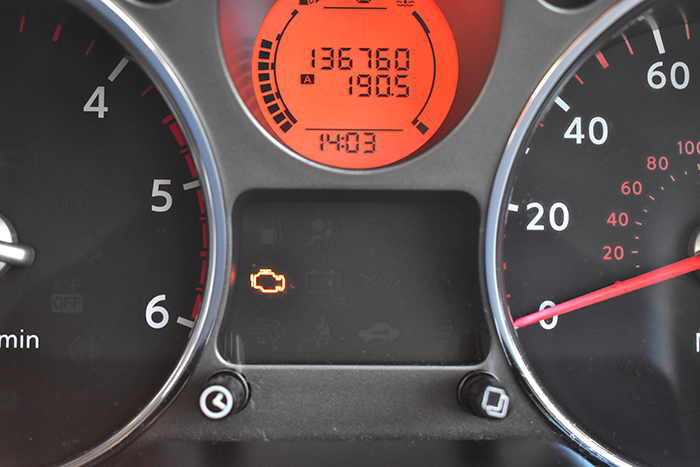That moment when your Nissan’s check engine light illuminates can certainly be unsettling. Whether it’s glowing steadily or flashing urgently, it raises immediate questions and concerns. But there’s no need to worry—we’ve got you covered. At Conyers Nissan, we deliver dealership-caliber diagnostics that eliminate uncertainty and get you back on the road with genuine confidence.
Unlike the basic code readers you’ll find at auto parts stores, our advanced diagnostic equipment and factory-trained technicians dig far deeper than surface-level error codes. We don’t simply identify the problem—we explain the underlying cause and outline the most effective solution. And should repairs be necessary, we’ll walk you through exactly what’s involved, with complete transparency and zero pressure.

Don’t Ignore Your Nissan’s Check Engine Light: What It Could Mean
That amber warning on your dashboard serves as more than just a momentary distraction—it’s your vehicle’s built-in communication system alerting you to a potential issue. While some triggers are relatively minor and straightforward to address, others can lead to significant engine or emissions system damage if left unattended. Prompt action could save you hundreds or even thousands in preventable repair costs down the road.
Common Reasons Your Nissan Check Engine Light is On
Loose Gas Cap
This surprisingly common issue is often overlooked but easily remedied. When your gas cap is loose, damaged, or missing altogether, it disrupts your vehicle’s evaporative emissions system, triggering the warning light.
Oxygen Sensor Failure
This critical component monitors your engine’s fuel combustion efficiency. When it fails, you’ll likely experience decreased gas mileage and increased emissions—and if neglected, it may ultimately damage your catalytic converter.
Catalytic Converter Problems
This emissions-critical component transforms harmful exhaust gases into less dangerous substances. When it begins to fail, you might notice sluggish acceleration, rough idling, or diminished fuel economy—potentially leading to substantial repair expenses.
Spark Plug or Ignition Coil Issues
These components form the backbone of your engine’s combustion process. Faulty plugs or coils often cause engine misfires, difficult starts, and can lead to lasting damage if not addressed promptly.
Mass Airflow Sensor (MAF) Issues
Tasked with measuring incoming air to the engine, a compromised MAF sensor typically results in difficult starting, hesitant acceleration, and unpredictable transmission shifting patterns.
Flashing vs. Solid Check Engine Light: Know the Difference
Solid Check Engine Light: This typically indicates a non-emergency issue, such as a minor sensor malfunction or emissions system irregularity. While not an immediate crisis, it still warrants timely diagnosis to prevent future complications or reduced efficiency.
Flashing Check Engine Light: Consider this your vehicle’s version of an emergency call. A flashing light generally indicates a severe engine misfire that can rapidly damage your catalytic converter. If you notice this warning, safely pull over and contact us right away.
Why Choose Conyers Nissan for Diagnostics Over a Free Scan?
While a complimentary scan at your local parts retailer might seem convenient, those tools only provide a basic trouble code—they can’t properly interpret the nuanced data from your Nissan’s sophisticated onboard systems, nor can they pinpoint the actual underlying issue.
At Conyers Nissan, we utilize the factory CONSULT diagnostic platform specifically engineered for Nissan vehicles. This specialized system communicates directly with your vehicle’s various modules and sensors, giving our certified technicians comprehensive insight into what’s happening—not just a generic error code.
With extensive model-specific training, our technical team can readily distinguish between false readings and genuine malfunctions. This level of specialized knowledge translates to more accurate diagnostics and efficient repairs—providing peace of mind you simply won’t find elsewhere.
Our Nissan Check Engine Light Diagnostic Process
- Initial code retrieval using CONSULT
- Full vehicle systems scan and sensor validation
- Hands-on inspection by a Nissan-certified technician
- Clear explanation of the issue with actionable options
- Transparent, no-pressure quote if repairs are needed
FAQs
Q: What causes a Nissan check engine light to come on?
A: It can be something simple like a loose gas cap, or more serious like a failed oxygen sensor, spark plug issue, or catalytic converter problem. Only a full diagnostic can identify the true cause.
Q: Is a flashing check engine light worse than a solid one?
A: Yes. A flashing light means an active misfire that can destroy your catalytic converter. Stop driving and get it checked immediately.
Q: Are free check engine light scans accurate?
A: They’re basic and limited. Free scans give you a code, but not context. They don’t access your car’s deeper systems or help you interpret the root cause — dealership-level diagnostics do.
Q: How much does a check engine light diagnostic cost?
A: Diagnostic fees at dealerships typically range from $50 to $150, but exact costs may vary by location and vehicle model. Many dealerships apply the diagnostic fee toward your repair if you choose to move forward, though this may vary by location. You’ll always get a clear estimate before any work is done.
Q: Can I keep driving with the light on?
A: If it’s solid, you may be able to drive short distances. But get it checked ASAP. If it’s flashing, stop immediately — continuing to drive can cause serious damage.
Call us at (678) 369 7985 if you need immediate help with your check engine light.
Want to understand more about OBD-II codes? Visit the EPA’s guide to Onboard Diagnostics.
Book your expert diagnostic service now and drive with confidence:
Prefer to talk first? Contact us here — we’re happy to help.
